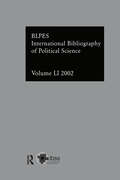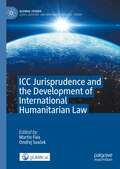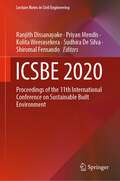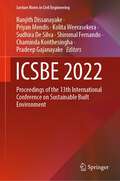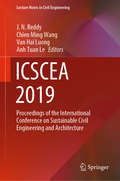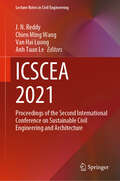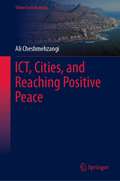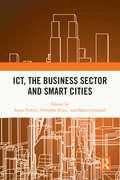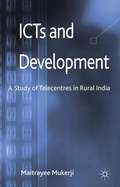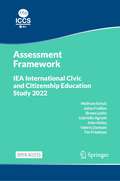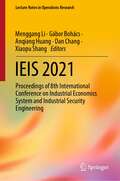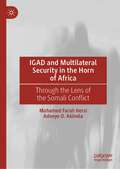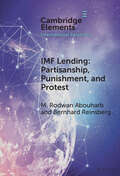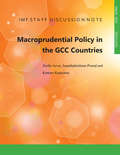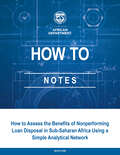- Table View
- List View
IBSS: Political Science: 2002 Vol.51
by Jean SykesFirst published in 1952, the International Bibliography of the Social Sciences (anthropology, economics, political science, and sociology) is well established as a major bibliographic reference for students, researchers and librarians in the social sciences worldwide. Key features * Authority : rigorous standards are applied to make the IBSS the most authoritative selective bibliography ever produced. Articles and books are selected on merit by some of the world's most expert librarians and academics. * Breadth : today the IBSS covers over 2000 journals - more than any other comparable resource. The latest monograph publications are also included. * International Coverage : the IBSS reviews scholarship published in over 30 languages, including publications from Eastern Europe and the developing world. * User friendly organization : all non-English titles are word sections. Extensive author, subject and place name indexes are provided in both English and French. Place your standing order now for the 2002 volumes of the the IBSS Anthropology : 2002 Vol.48 December 2002: 234x156: 0-415-32634-6: u195.00 Economics : 2002 Vol.51 December 2002: 234x156: 0-415-32635-4: u195.0 0 Political Science : 2002 Vol.51 December 2002: 234x156: 0-415-32636-2: u195.00 Sociology : 2002 Vol.52 December 2002: 234x156: 0-415-32637-0: u195.00
ICC Jurisprudence and the Development of International Humanitarian Law (Global Issues)
by Martin Faix Ondřej SvačekThis book explores how International Humanitarian Law (IHL) has been developed in the jurisprudence and practice of the International Criminal Court (ICC). A partial focus is given to the phenomenon of child soldiering which became symptomatic for the early practice of the ICC. The book provides readers with broad insight into the activity of the ICC. The first part contains chapters focused on the methodology of law-finding before the ICC, i.e., identification, interpretation, and application of the law. The authors address complex issues concerning the mutual relationship between treaty law (Article 8 of the ICC Statute) and customary international (humanitarian) law and explore the relevance of IHRL in the application and interpretation of Article 8 of the Rome Statute. The second part consists of chapters focused on substantive international criminal law. The authors address issues concerning contextual elements of war crimes, passive personal scope of IHL,denying judicial guarantees as a serious breach of IHL, forms of responsibility, and circumstances precluding wrongfulness.
ICSBE 2020: Proceedings of the 11th International Conference on Sustainable Built Environment (Lecture Notes in Civil Engineering #174)
by Ranjith Dissanayake Priyan Mendis Kolita Weerasekera Sudhira De Silva Shiromal FernandoThis book highlights the latest knowledge and innovations in the field of civil engineering and construction industry striving for a sustainable built environment. It includes recent innovative findings from the proceedings of the 11th ICSBE 2020 under the themes of sustainable tall buildings, sustainable bridge construction and maintenance, waste in construction industry, sustainable manufacturing and recycling, disaster risk reduction for sustainable built environment, green innovations and entrepreneurship, sustainable water management in developing countries, water pollution and CKDu, sustainable urban environment and social well-being, and many greener and sustainable resource and energy-efficient innovative research findings.
ICSBE 2022: Proceedings of the 13th International Conference on Sustainable Built Environment (Lecture Notes in Civil Engineering #362)
by Ranjith Dissanayake Priyan Mendis Kolita Weerasekera Sudhira De Silva Shiromal Fernando Chaminda Konthesingha Pradeep GajanayakeThis book highlights the latest knowledge and innovations in the fields of civil engineering and construction industry striving for a sustainable built environment. It consists of high quality and innovative research findings selected from the proceedings of the 13th ICSBE 2022 under the themes of sustainable construction, urban green infrastructure and planning, rainwater harvesting and water conservation, high-performance concrete, indoor environmental quality and indoor plants, wind and hydro-power energy, waste and wastewater management for enhanced sustainability, impacts of climate change, carbon footprint, global climate model and landscaping, material flows and industrial ecology, sustainable materials, etc.
ICSCEA 2019: Proceedings of the International Conference on Sustainable Civil Engineering and Architecture (Lecture Notes in Civil Engineering #80)
by J. N. Reddy Chien Ming Wang Van Hai Luong Anh Tuan LeThis book presents papers from the International Conference on Sustainable Civil Engineering and Architecture 2019, which was held in Ho Chi Minh City, Vietnam, from 24–26 October 2019. The conference brought together international experts from both academia and industry to share their knowledge and experiences, and to facilitate collaboration and improve cooperation in the field. The book highlights the latest advances in sustainable architecture and civil engineering, covering topics such as offshore structures, structural engineering, construction materials, and architecture.
ICSCEA 2021: Proceedings of the Second International Conference on Sustainable Civil Engineering and Architecture (Lecture Notes in Civil Engineering #268)
by J. N. Reddy Chien Ming Wang Van Hai Luong Anh Tuan LeThis book presents articles from the Second International Conference on Sustainable Civil Engineering and Architecture, held on 30 October 2021 in Ho Chi Minh City, Vietnam. The conference brings together international experts from both academia and industry to share their knowledge, expertise, to facilitate collaboration and improve cooperation in the field. The book highlights the latest advances in sustainable architecture and civil engineering, covering topics such as offshore structures, structural engineering, construction materials, and architecture.
ICT, Cities, and Reaching Positive Peace (Urban Sustainability)
by Ali CheshmehzangiThis book is the first attempt to explore the use and application of Information and Communication Technology (ICT) and related smart technologies in cities and for the sole purpose of reaching positive peace. The everyday usage of digital technologies in cities encourages us to study the benefits, co-benefits, disadvantages, and threats of ICT application in cities and urban environments. The continuous growth of digital technologies and their growing demand in everyday urban practices and systems are already known to scholars, practitioners, and policy-makers. However, this book explores whether or not such applications and usage help us reaching positive peace. This approach is novel in the field of urban studies, allowing us to identify and highlight best practices, successes, and failures of ICT application to meet positive peace pillars. The scope of the book highlights our focus on positive peace and its eight pillars, mainly how they are meant to be achieved in cities and urban areas. With an analytical view on the topic, we aim to reflect on the systematic features of urban systems, using positive peace pillars as the primary targets. We believe ICT application and usage in cities could be more directive and beneficial to reach peace and prosperity to achieve such a goal. Therefore, this book provides a holistic guideline and coverage of ICT use for positive peace pathways and peace-building practices. We hope the findings of the book help researchers and policy-makers to come up with novel and integrated strategies, ensuring that our everyday usage of digital technologies, ICT, and smart tools, are more meaningful and people-oriented.
ICT, the Business Sector and Smart Cities
by Anna Visvizi Orlando Troisi Mara GrimaldiThis book examines smart cities through the lens of the information and communication technology (ICT)-driven transformation of the economy and economic systems and the resulting changes influencing organizations (public, private, and voluntary) and citizens in the smart city. In this context, the chapters included in this book address very specific questions pertaining to modes and models of economic collaboration, interest aggregation, and determinants of sustainable growth and development in the smart city. To this end, the circular economy, the sharing economy, the platform economy, and open innovation in the smart city are discussed. The notions of economic performance, competition, and business model innovation (BMI) are elaborated in detail. Finally, the question of the fragility of labor markets, including the availability of talent, is explored. By applying conceptually sound, inter- and multi-disciplinary approaches, frequently including case studies, this book provides a thorough insight into the complex question of how tools specific to the fields of economics, business management, innovation management, strategic management, entrepreneurship, and human resource management can be useful in view of understanding and harnessing the intrusion of ICT in the city space.
ICTs and Development
by Maitrayee MukerjiJuxtaposes the global discourse on ICT-D with in-depth case studies on the pattern of access and use of telecentres to draw implications for the possible development trajectories induced by the provision of ICTs in rural hinterlands of India.
IEA International Civic and Citizenship Education Study 2022 Assessment Framework
by Julian Fraillon John Ainley Wolfram Schulz Tim Friedman Bruno Losito Gabriella Agrusti Valeria DamianiThis open access publication outlines the underlying framework for gathering data on civic knowledge, attitudes, and engagement as well as contextual information, and it describes the assessment design for the International Association for the Evaluation of Educational Achievement’s (IEA) International Civic and Citizenship Education Study 2022.The IEA International Civic and Citizenship Study (ICCS) investigates how young people are prepared to undertake their roles as citizens in a range of countries in the second decade of the 21st century. ICCS 2022 is a continuation of two earlier IEA studies, ICCS 2009 and ICCS 2016, and, for the first time, this survey includes the option of a computer-based assessment. Responding to enduring and emerging challenges of educating young people in a world where contexts of democracy and civic participation continue to change, the study addresses issues related to young people’s engagement through digital technologies, migration and diversity, perceptions of the political system, global citizenship, and education for sustainable development. Over the past 50 years, IEA has conducted comparative research studies in a range of domains focusing on educational policies, practices, and outcomes in many countries around the world. Prior to ICCS 2022, IEA conducted four international comparative studies of civic and citizenship education, with a first survey implemented in 1971, a second one in 1999, third in 2009 and fourth in 2016. ICCS 2022 data will allow education systems to evaluate the strengths of educational policies, both internationally, and in a regional context, and to measure progress in achieving critical components of their educational policy agendas.
IEIS 2021: Proceedings of 8th International Conference on Industrial Economics System and Industrial Security Engineering (Lecture Notes in Operations Research)
by Menggang Li Dan Chang Xiaopu Shang Gábor Bohács Anqiang HuangThis book aims to provide new research methods, theories and applications from various areas of industrial economics and engineering. In detail, the included scientific papers analyse and describe communication processes in the fields of industrial economics, industrial system, industrial security and engineering and other related areas. The variety of the papers delivers added value for both scholars and practitioners. This book is the documentation of the IEIS 2021 conference. The book covers a great deal of research achievements in industrial restructuring strategy, industrial organization, industrial policy, departmental economic research, industrial competitiveness, regional industrial structure, national industrial economic security theory and empirical research, and it emphasizes on combining theory with practice. The book aims to discuss the issues in industrial economics and industrial security theories and practices. It is the documentation of IEIS 2021 conference, which took place at Shandong University. Due to the impact of COVID-19, it took place online as a virtual conference.
IGAD and Multilateral Security in the Horn of Africa: Through the Lens of the Somali Conflict
by Adeoye O. Akinola Mohamed Farah HersiThis book offers an insightful and comprehensive exploration of the Inter-Governmental Authority for Development (IGAD) and its endeavours to foster economic and security regionalism in the dynamic landscape of the Horn of Africa. Established in 1986 as a drought-focused inter-governmental organization, IGAD has transformed into a sub-regional institution with an ambitious vision of promoting regional integration. However, amidst optimism, it grapples with historical, strategic, and geographical complexities that impede progress towards a more unified Horn of Africa. Adopting a political economy approach, the book critically dissects IGAD's role in shaping the zone's security and development. Employing multidisciplinary case studies, it unveils the reality of IGAD's efforts, providing a comprehensive understanding of its strengths and limitations. The book further applies neorealist and regional security complex theories, delving into the roles of states and non-actors, meticulously assessing IGAD's security agenda with Somalia as a focal point. This thought-provoking analysis brings to light the challenges and opportunities for sustainable regional integration. Beyond its academic significance, this book serves as a practical resource, offering sustainable policy templates to bolster regionalism and quell armed insurrections and inter-state conflicts within the Horn. Furthermore, it interrogates the geopolitics of the region, scrutinizing the involvement of foreign powers like the US and China, alongside regional giants like Ethiopia, in IGAD's security and economic aspirations. For researchers, policymakers, and stakeholders devoted to the Horn of Africa's development and reconstruction, this book proves to be an invaluable asset. It fills a significant void in existing literature, providing vital insights into African political development, peace, security, and security sector reforms.
IMF Interactions with Member Countries
by International Monetary FundThis report presents the findings of an evaluation of the effectiveness of IMF interactions with its member countries during the period 2001-08, with special emphasis on 2007-08. it analyzes IMF interactions with its entire membership, broken down into three main country groups: advanced economies, emerging economies, and Poverty Reduction Growth Facility (PRGF)-eligible countries. The report comes at a critical juncture For The international monetary system, when the IMF has adopted a more flexible approach to lending and been given new responsibilities, As well as a major infusion of resources to help members deal with the global financial crisis. it highlights lessons learned from the evaluation that are most relevant To The tasks that lie ahead For The IMF.
IMF Lending: Partisanship, Punishment, and Protest (Elements in International Relations)
by M. Rodwan Abouharb Bernhard ReinsbergThis Element argues that governments allocate adjustment burdens strategically to protect their supporters, imposing adjustment costs upon the supporters of their opponents, who then protest in response. Using large-N micro-level survey data from three world regions and a global survey, it discusses the local political economy of International Monetary Fund (IMF) lending. It finds that opposition supporters in countries under IMF structural adjustment programs (SAP) are more likely to report that the IMF SAP increased economic hardships than government supporters and countries without IMF exposure. In addition, it finds that partisan gaps in IMF SAP evaluations widen in IMF program countries with an above-median number of conditions, suggesting that opposition supporters face heavier adjustment burdens, and that opposition supporters who think SAPs made their lives worse are more likely to protest. This title is also available as Open Access on Cambridge Core.
IMF Macroeconomic Research on Low-Income Countries
by International Monetary FundA report from the International Monetary Fund.
IMF Staff Country Reports
by Fiscal Affairs Legal MonetaryAs required under Article IV of its Articles of Agreement, the International Monetary Fund (IMF) conducts periodic consultations with its member countries. This IMF Staff Report for the 2000 Article IV consultation with Germany concludes that the near-term outlook for the German economy is more favourable that it has been for many years, reflecting a markedly improved external environment, supportive monetary conditions, moderate wage settlements and a clearer direction in domestic policies. The risks to the near-term outlook - persistently high oil prices and a possible sharp appreciation to the Euro - are unlikely to derail the expansion.
IMF Staff Country Reports
by International Monetary Fund Teresa Ter-MinassianAs required under Article IV of its Articles of Agreement, the International Monetary Fund (IMF) conducts periodic consultations with its member countries. This IMF Staff Report for the 2000 Article IV consultation with Germany concludes that the near-term outlook for the German economy is more favourable that it has been for many years, reflecting a markedly improved external environment, supportive monetary conditions, moderate wage settlements and a clearer direction in domestic policies. The risks to the near-term outlook - persistently high oil prices and a possible sharp appreciation to the Euro - are unlikely to derail the expansion.
IMF Staff Discussion Note
by Ananthakrishnan Prasad Zsofia Arvai Kentaro KatayamaA report from the International Monetary Fund.
IMF Support to Jordan, 1989-2004
by International Monetary FundA report from the International Monetary Fund.
IMF Technical Assistance: Transferring Knowledge and Best Practice
by International Monetary FundA report from the International Monetary Fund.
IMF-Supported Programs in Indonesia, Korea, and Thailand
by Marianne Schulze-Gattas Timothy D. Lane T. M. TsikataA report from the International Monetary Fund.
IMF: 2013 Article Iv Consultation (Imf How To Notes Ser. #No. 13/37)
by International Monetary FundA report from the International Monetary Fund.
